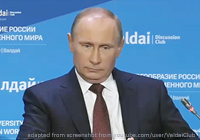Putin’s Plan to Merge Courts Criticized by Judges

(Moscow Times – themoscowtimes.com – Ivan Nechepurenko – November 12, 2013) Supreme Arbitration Court judges have lambasted President Vladimir Putin’s plans to merge the legal body with the Supreme Court, saying that the resulting superstructure will be too cumbersome and less independent in administering justice.
The way judges will be appointed to the new structure does not “conform with the constitutional principle of the irremovability of judges,” the Supreme Arbitration Court said in a letter signed by its chairman Anton Ivanov, Kommersant reported Tuesday.
The merger bill will force judges to take an exam if they want to join the new structure, a move that caused uproar in the judicial community.
At least seven Supreme Arbitration Court judges resigned in October and many more were said to be considering handing in their notices. The arbitration court currently has 53 judges.
Furthermore, the bill doesn’t say when the newly formed court’s work will get under way, while the six month period allotted for the abolition of the Supreme Arbitration Court is insufficient, the letter said.
Putin proposed the merger at the St. Petersburg International Economic Forum in June, citing the need to “ensure uniform approaches to the resolution of disputes involving both individuals, as well as disputes with state authorities and local governments.”
Putin also said the court should be based in St. Petersburg, where a whole judicial quarter is to be built in the city center.
The Constitution and 28 laws will also be amended as part of the merger.
The judges claim that the merger will demolish the whole system of resolving commercial disputes. The system has been lauded as one of the greatest achievements of Russia’s judiciary over the last two decades.
The State Duma will start reviewing the bill on Tuesday.
The Cabinet, headed by Dmitry Medvedev, did not have any objections to the reform, despite many observers saying that it could reduce his influence by curtailing the powers of his allies.
